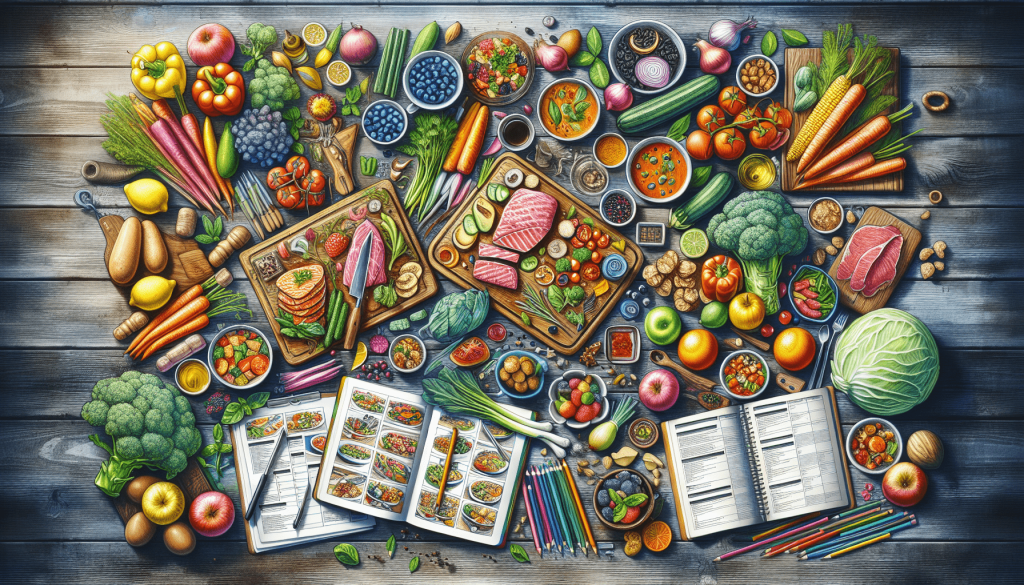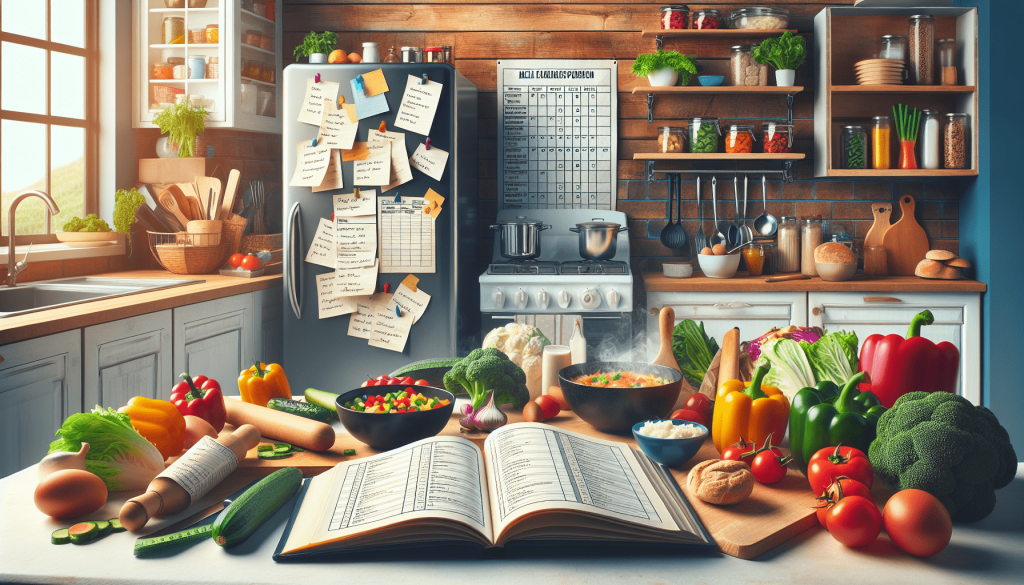Are you tired of constantly scrambling to figure out what to cook for dinner? Do you find yourself eating out more often than you’d like simply because you don’t have a plan in place? Look no further – we’ve got you covered! In this article, we’ll provide you with essential tips and strategies to help you master the art of meal planning and prep. Say goodbye to last-minute food decisions and hello to stress-free, delicious meals that are ready to go when you need them. Get ready to save time, money, and energy in the kitchen – let’s dive in!

Choose a meal planning method
When it comes to meal planning, it’s important to choose a method that suits your lifestyle and preferences. There are several different approaches you can consider, so take the time to explore them and find the one that works best for you and your family.
Batch cooking is a popular method where you prepare large quantities of meals in advance and store them for future consumption. This can save you time during the week as you only need to reheat the meals. Theme nights are another option, where you assign different themes to each night of the week, such as Mexican Mondays or Italian Wednesdays. This can add variety to your meals while still providing structure to your planning. Alternatively, you may prefer individual portion assembly, where you plan and prepare each meal separately according to your family’s preferences.
Ultimately, it’s important to consider your lifestyle, dietary needs, and personal preferences when choosing a meal planning method. Finding one that aligns with your goals and makes the process enjoyable will greatly increase your chances of success.
Make a weekly meal plan
Creating a weekly meal plan is a key step in effective meal planning and prep. Start by taking inventory of the ingredients you already have in your pantry, fridge, and freezer. This will help you make the most of what you already have and minimize waste.
Next, consider the nutritional needs of your family. Take into account any dietary restrictions, preferences, or goals you may have. This will ensure that you plan meals that are not only delicious but also nourishing.
To further minimize waste and maximize efficiency, plan meals that use similar ingredients. For example, if you know you will be using half an onion for one dish, plan another meal that also calls for half an onion. This way, you can use up all the ingredients before they spoil.
Lastly, be sure to include variety in your meal plan. Eating the same thing every day can quickly lead to boredom and the temptation to deviate from your plan. By incorporating a range of flavours, cuisines, and cooking methods, you can keep things interesting and enjoyable for you and your family.
Create a grocery list
Once you have your meal plan in place, it’s time to create your grocery list. Refer to your meal plan and make note of any ingredients you need to buy. This will help ensure you have everything you need when it comes time to cook.
To make your shopping trip as efficient as possible, consider organizing your list by sections of the store. This will help you navigate the aisles quickly and avoid unnecessary backtracking.
Another option to consider is online grocery shopping. Many supermarkets now offer this service, allowing you to order your groceries from the comfort of your own home. This can be a great time-saver, especially if you have a busy schedule.
Prep ingredients in advance
Preparing ingredients in advance can be a game-changer when it comes to efficient meal planning and prep. Taking the time to wash, chop, and store fruits and vegetables can save you valuable minutes during meal preparation.
You can also pre-cook or marinate proteins in advance. For example, you can cook a batch of chicken breasts and store them in the fridge or freezer for quick and easy meals throughout the week. Similarly, marinating meat or tofu in advance can infuse it with flavour and save you time during the week.
Consider portioning out ingredients for individual meals or snacks as well. This can make it easier to grab and go when you’re in a rush or simply looking for a healthy snack option.

Use time-saving cooking techniques
Investing in kitchen gadgets like a slow cooker or instant pot can be a game-changer when it comes to meal planning and prep. These devices allow you to set and forget your meals, saving you time and effort.
One-pot meals and sheet pan dinners are another great option for saving time and minimizing cleanup. By cooking everything in one dish, you can simplify your cooking process while still creating delicious and wholesome meals.
Cooking large batches and freezing leftovers is an excellent way to ensure you always have a meal on hand. By portioning out leftovers into individual servings, you can easily defrost and reheat them for future meals. This can be especially helpful on busy nights when you don’t have time to cook from scratch.
Batch cook and meal prep
Batch cooking and meal prep are a meal planner’s best friends. By setting aside a designated time for batch cooking, you can prepare large quantities of staple ingredients like rice or chicken. These can then be divided into individual portions and stored in the fridge or freezer.
Meal prepping can also involve preparing entire meals in advance and storing them for future consumption. This can be as simple as assembling and packaging individual lunches for the week or prepping complete dinners that only require reheating.
The key to successful batch cooking and meal prepping is to plan ahead. Know what recipes you want to make, gather your ingredients, and set aside the necessary time to complete the tasks. This investment of time upfront will pay off throughout the week when you have delicious and convenient meals ready to go.
Label and store prepped ingredients properly
Properly labeling and storing prepped ingredients is crucial for maintaining freshness and organization. Use clear labels to indicate the contents and date of preparation. This will help you keep track of how long items have been stored and ensure you use them before they spoil.
Storing prepped ingredients in airtight containers is another important step. This helps to maintain freshness and prevent any odours or flavours from transferring between different foods. Mason jars, plastic containers, or even resealable bags can all be viable options depending on the specific ingredient.
To keep everything organized, consider arranging your fridge and freezer with prepped ingredients in mind. Designate specific areas or shelves for different types of ingredients, making it easy to locate what you need when it’s time to cook.
Streamline your cooking process
Streamlining your cooking process can make meal planning and prep a breeze. Start by tackling tasks that take the longest first, such as preheating the oven or bringing water to a boil. This way, while your oven is preheating or water is boiling, you can work on other components of your meal.
Optimizing oven space is another key strategy. If you’re using the oven for one recipe, consider baking multiple dishes at once. This way, you can maximize your energy usage and minimize the overall cooking time.
Cleaning as you go is also essential for a streamlined process. Wash dishes, wipe counters, and put away unused ingredients as you go. This will minimize mess and make cleanup much easier once your meal is ready.
Create a backup plan
Even with the best-laid plans, life can sometimes throw a wrench in our meal planning and prep. That’s why it’s important to have a backup plan for those hectic days when everything seems to go wrong.
Keep a few quick and easy recipes on hand that you can whip up in a pinch. These can be simple pasta dishes, stir-fries, or salads that require minimal prep and cooking time.
Pantry staples like canned beans, pasta, or frozen vegetables can also be lifesavers when you’re short on time. These ingredients can be quickly transformed into a nutritious and satisfying meal with a few additional fresh ingredients.
Utilizing leftovers creatively is also a great way to avoid waste and save time. Don’t be afraid to repurpose leftovers into new dishes or incorporate them into lunches the next day. This can help you make the most of the food you have and add variety to your meals.
Stay flexible and adaptable
While having a meal plan and prep routine is important, it’s equally important to stay flexible and adaptable. Life happens, and schedules and circumstances can change at a moment’s notice. Don’t be afraid to make changes to your meal plan as needed.
If you find yourself missing an ingredient, be creative with substitutions or variations based on what you have on hand. Experiment with different flavours, spices, and ingredients to create new and exciting dishes.
Adjust your meal prep routine based on feedback and experiences. If you find that certain meals are too time-consuming or don’t fit well into your schedule, make adjustments. Meal planning and prep should work for you, not against you, so don’t hesitate to make changes that better suit your needs.
By following these essential tips for meal planning and prep, you can save time, reduce stress, and enjoy delicious and nutritious meals every day. Remember, the key is to find a method that works for you and your family and to stay flexible and adaptable as you navigate the ever-changing landscape of mealtime. Happy planning and happy cooking!
